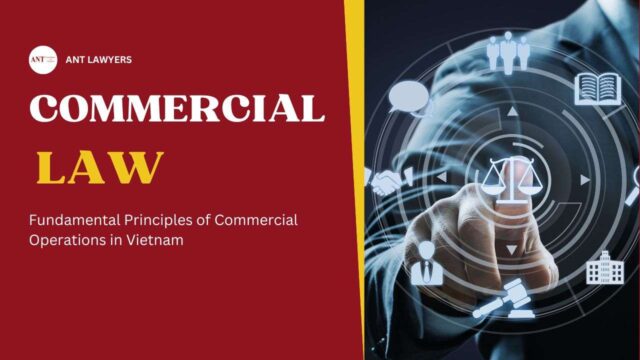Navigating the complex world of commerce in Vietnam requires a deep understanding of the foundational principles as outlined by the Commercial Law. This law establishes six core principles which are vital for anyone engaged in commercial activities. These principles form the bedrock upon which trade is conducted, ensuring fairness, transparency, and legal certainty.
6 Principles of Commercial Law in Vietnam
1.Legal Equality for Business Entities of Commercial Law.
2.Freedom and Voluntary Agreement of Commercial Law
3.Adherence to Established Commercial Practices
4.Application of Commercial Customs
5.Protection of Consumer Interests
6.Recognition of Data Messages’ Legal Value
Legal Equality for Business Entities of Commercial Law
A cornerstone of the Vietnamese commercial landscape is the principle of legal equality for all business entities. The Commercial Law enshrines the right of traders, regardless of their economic sector, to operate on an equal legal footing in commercial activities. This principle guarantees that the law does not discriminate between businesses, fostering an equitable environment for commerce.
Freedom and Voluntary Agreement of Commercial Law
The law places a high value on the freedom and voluntary nature of agreements within the commercial sector. Parties are free to negotiate their terms as long as they do not violate legal provisions, social ethics, or local customs. The state acknowledges and protects these rights, reinforcing the autonomy of commercial entities. Moreover, all parties are expected to engage willingly in trade, with no room for coercion, intimidation, or obstruction.
Adherence to Established Commercial Practices
Unless otherwise agreed upon, parties may adhere to longstanding commercial practices. These practices serve as informal guidelines that complement formal legislation, provided they do not contravene any legal stipulations. This principle enables businesses to rely on established norms to navigate transactions where the law may not provide clear direction.
Application of Commercial Customs
In instances where the law remains silent, parties have not reached an agreement, and there are no established practices, commercial customs come into play. These customs, however, must not conflict with the fundamental principles laid out in the Commercial Law or the Civil Code. They act as a default framework for conducting commerce, filling in gaps and providing a fallback mechanism for decision-making.
Protection of Consumer Interests
An essential principle of the Vietnamese commercial system is the protection of legitimate consumer interests. Traders engaged in commercial activities have an obligation to provide complete and truthful information to consumers regarding the quality and legality of their goods and services. They are held accountable for the accuracy of such information, underlining the commitment to consumer rights and ethical business practices.
Recognition of Data Messages’ Legal Value
With the advent of digital commerce, the Commercial Law recognizes the legal value of data messages. Such messages, if they meet specified conditions and technical standards set by legislation, are granted legal validity equivalent to traditional written documents. This adaptation ensures that the commercial law keeps pace with technological advancements and the evolving landscape of digital trade.
Understanding the Principles for Effective Commerce
These principles are not just a legal formality but a practical guide for conducting business effectively in Vietnam. They offer a framework within which traders can operate with confidence. Understanding these principles allows for better negotiation, more robust contract formation, and effective risk management. It also fosters a transparent commercial environment where businesses can thrive and consumers are safeguarded.
Integration with Global Best Practices
These foundational principles also align Vietnam with global best practices. By establishing a legal framework that emphasizes equality, freedom of contract, respect for established practices, consumer protection, and recognition of digital transactions, Vietnam positions itself as a conducive environment for both local and international trade.
Applying Principles in Drafting Commercial Contracts
When drafting a commercial contract, one must ensure that these principles are reflected within the agreement. A draft commercial contract must be constructed in a way that upholds legal equality, fosters voluntary and fair negotiations, respects established commercial practices and customs, protects consumer interests, and acknowledges the validity of digital communication.
In conclusion, the six fundamental principles of the Commercial Law provide a robust foundation for commercial activities in Vietnam. For investors and traders, a keen appreciation and application of these principles are critical for success. As Vietnam continues to grow as a key player in international commerce, these principles will remain vital in navigating its vibrant commercial sphere.
ANT Lawyers, law firm in Vietnam
We help clients overcome cultural barriers and achieve their strategic and financial outcomes, while ensuring the best interest rate protection, risk mitigation and regulatory compliance. ANT lawyers has lawyers in Ho Chi Minh city, Hanoi, and Danang, and will help customers in doing business in Vietnam.












